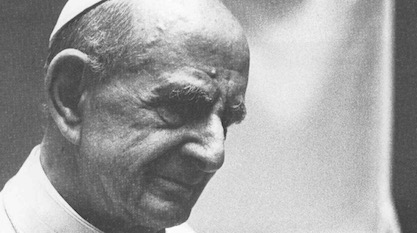 Faith & Science
Faith & Science
Humanae Vitae and Intelligent Design


On July 25, 1968, Blessed Pope Paul VI published his encyclical Humanae Vitae. It was, and is, the most controversial Catholic document of the past century, and perhaps of any century. The encyclical affirmed the Church’s ban on contraception in defiance of the majority of members of the Pope’s commission formed to study the question, and in defiance of the sexual zeitgeist of the modern era. Hence the firestorm.
Paul VI understood that acceptance of contraception and of the modern world’s sexual ethics would be a radical turnaround in the Church’s understanding of human beings and of moral law. Whatever one thinks about contraception, it is undeniable that Humanae Vitae was prophetic. Paul VI predicted that sexual modernity, exemplified by contraception, would lead to infidelity and moral decline, loss of respect for women, abuse of power by public authorities, and destructive radical assertions of autonomy over our bodies.
A Profound Reflection
Humanae Vitae was a profound reflection on men and women, on human nature, and on the purposes inherent in sexuality and procreation. The encyclical is an affirmation of natural law — of the view that there is objective good and evil, and that an understanding of nature can guide moral conduct. The encyclical is an emphatic reassertion that “ought” can be derived from “is.” It is an assertion that nature has purposes and that man is morally obliged to comply with them.
Humanae Vitae is a profound moral reflection on natural law — on purpose — in sexuality. The natural world, of which we are a part, is imbued with purpose, and that purpose can be inferred from careful and objective study of nature and of man. Paul VI observed that the purpose of sexuality — the ultimate end for which it exists — is procreation, and to close the sexual act to procreation is a violation of natural law and thus of moral law.
Now there are different perspectives on this invocation of natural law, even within the Church, and there are many who don’t accept natural law as a genuine moral guide. But the pontiff’s viewpoint is based on the discernment of purpose in sexuality, and the discernment of purpose in nature is the cornerstone of traditional ethics based on moral law.
Purpose in Nature
The discernment of purpose in nature does not stop at moral law and sexuality. Science is the study of purpose in the physical world, just as ethics, properly understood according to natural law, is the study of purpose in the moral sphere. The purpose of the Krebs cycle is to generate energy; the purpose of the heart is to pump blood; the purpose of sexual intercourse is to procreate. No genuine knowledge — either scientific or moral — of the natural world can exclude inference to purpose. Every act in creation has a telos — a goal for which it acts. Neither ethics nor science can be done properly without inference to teleology — to design — in nature. Just as natural law is a moral exploration of purpose in human affairs, Intelligent design is a scientific exploration of purpose — of teleology — in biology.
On this 50th anniversary of Humanae Vitae, it is worth reflecting on the ubiquity of purpose in the universe. There is purpose in all of creation — manifest in scientific laws, in cosmology, in genetics and molecular biology, in physiology and psychology, no less than in moral law. The world is saturated with design, in physical nature just as in moral affairs. And it is worth noting that intelligent design science has been met with intransigence and even hatred not unlike that which greeted Paul IV’s Humanae Vitae fifty years ago.
A Plea for Dignity
The denial of purpose in biology by Darwinists is vehement. Perhaps there is a grander goal in this denial. Denial of purpose inherent in biology is of a piece with denial of purpose inherent in morality. The acknowledgment of purpose of any sort inherent in nature is a repudiation of the modernist’s conception of man as the end of all things and as the ultimate moral law-giver. Such denial of higher purpose — of moral law independent of man’s desires — is the indispensable foundation of modern sexual mores.
Humanae Vitae was a plea to acknowledge that human sexuality has dignity that transcends man and has purposes beyond our own. The natural moral law asserted so eloquently in Humanae Vitae is an inference to design in morality that is akin to the inference to design in biology. But for atheists and materialists, there must be no design in science, because that would open the door for a Divine foot, and thus open the door as well for purpose and transcendence in moral law.
One suspects that it is abhorrence of moral purpose, even more than aversion to biological purpose, that is at the root of the Darwinist denial of intelligent design.
Photo: Pope Paul VI, by Ambrosius007 at English Wikipedia [CC BY-SA 3.0 or GFDL], from Wikimedia Commons.
